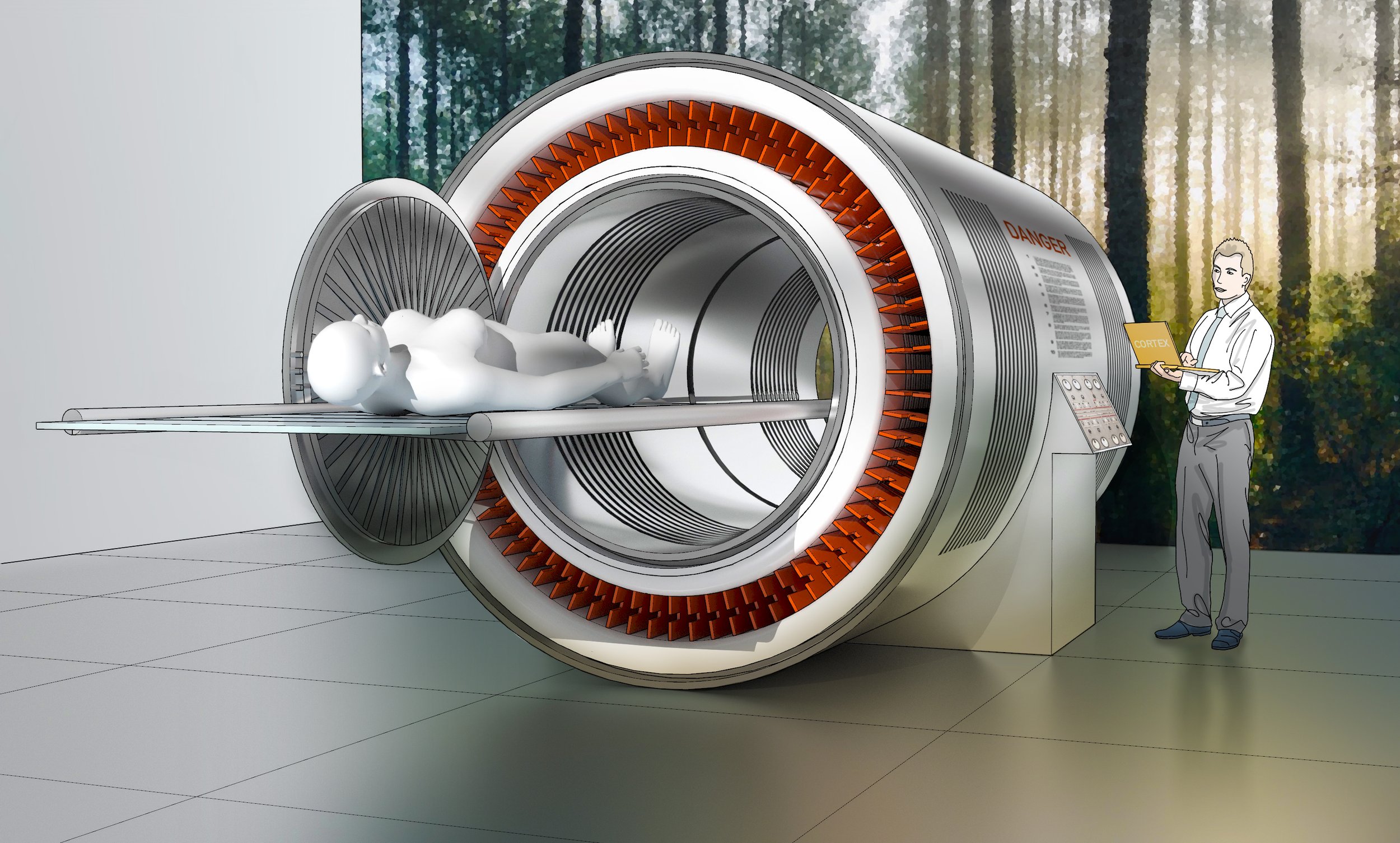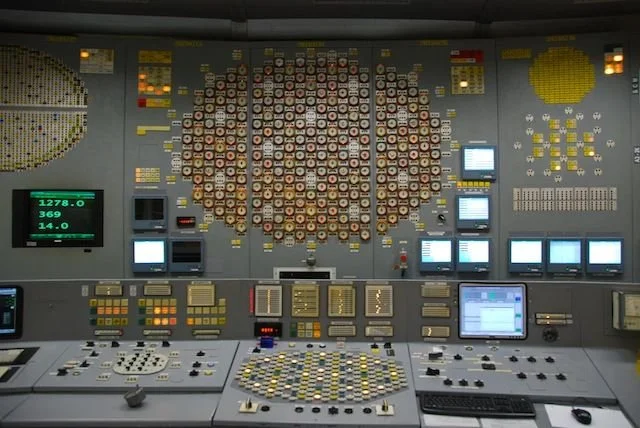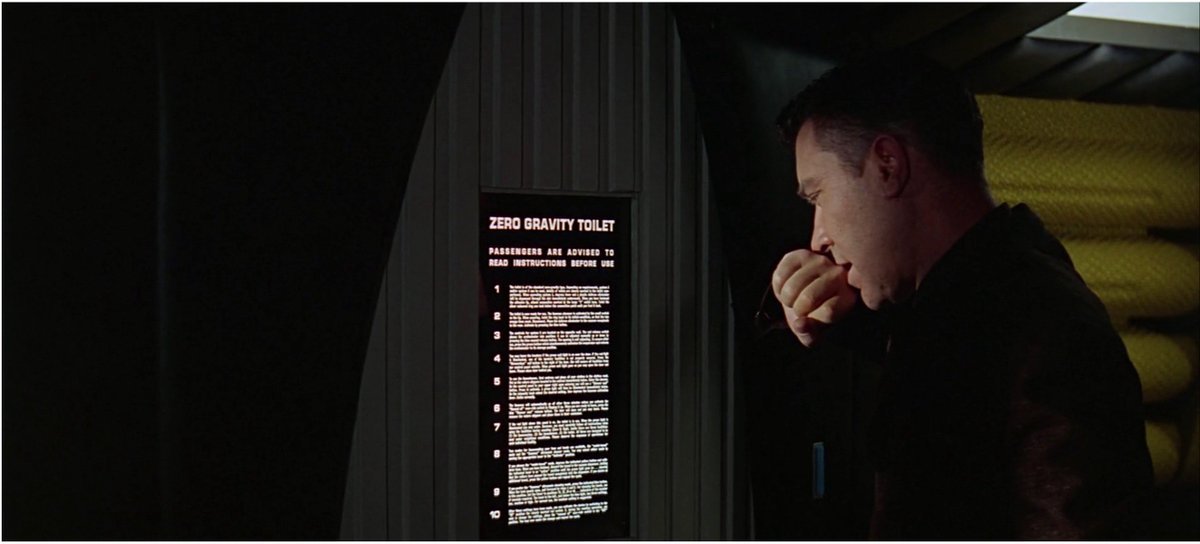WOULD YOU LIVE FOREVER IF YOU COULD ONLY REMEMBER A FRACTION OF IT? (2)
WHAT PRICE A FORGOTTEN ETERNITY?
Eye-level view of a scanner test run. Often scanners are in rooms with immersive environments (such as forests) to calm the customer.
Previously I looked at the technology behind Cortex's Full Body Scanner. This page I'm going to talk about some of the more challenging aspects these machines have brought to 2050s society.
These scanners destroy the original body while recording it— they work like particle accelerators and break the body down into its sub atomic particles, recording them in the process. This means getting scanned requires a leap of faith: Is the reprint actually you? Is a copy as good as the original?
(Another side benefit of having a “destructive” scanner is that it would avoid the messy business of creating two simultaneous versions of the same person, e.g., the unharmed original on Earth, the reprint on Mars. In the brutal world of 2050 this would not be allowed—one would have to die.)
It was also important to me that scanning and reprinting technology was not perfect. I’ve always found that perfection limits where you can go with a story (sure, there are novels where a perfect solution leads to terrible consequences, but that is more for one-off stories).
While in use the scanner rooms are typically unoccupied. The rooms themselves are constructed like nuclear containment vessels and designed to withstand a 'rapid disassembly event' of the equipment should it fail.
The 'mouth' was the most complex part of the design to get right, and it took a lot work. After many false starts I thought about the 'kit-of-parts' approach I used for the Hopper and CWS gun designs (I will write two emails about Alice's weapons in a few weeks). The guns are cooled by a radial heat-fin, so I took that as design inspiration. The scanner is circular, and likely to produce a lot of heat: I added an inner, solid portion containing the person; a large, red, radial heats-sink array to cool the machine; then the outer shell containing the triple particle accelerators.
Now where have I seen that control panel before? Hmmm. I mean, what could possibly go wrong with a compact fusion reactor connected to triple particle accelerators? As long as they don't run any safety tests they'll be fine—it's only 3.5 Renken after all
Cortex's technical experts will ensure nothing bad happens to you.
Due to the scanner's energy demands they are often run during 'blackout' conditions where other power sources are shut off to reduce overall loading.
So what limits to these machines are there?
You can’t scan a reprint without errors being introduced into the 3D model. Like photocopying a photocopy, a scan of a scan leads to a reduction in data integrity. The data error could be as minor as a freckle, or as major as a lethal disease. This creates huge consequences for those wanting to live forever.
Let’s think of an example: Susan is eighteen years old, at her physical peak, but has lived a sheltered life and doesn’t have the street-smarts necessary to survive in such a harsh world. If she gets scanned, her reprint will also be at its physical peak, and could live another seventy years. But, at the end of those seventy years, Susan has the choice of dying naturally, or being reprinted from her scan and emerging back as that naïve eighteen-year-old. Those seventy years of memories and life will be lost forever. Yes, theoretically, Susan could be reprinted forever, but only in a perpetual state of déjà vu, forced to relive the same life, over and over.
Or does Susan wait to get rescanned at fifty? Then every consequential reprint would exist in a body that has decreased physical attributes in comparison to her eighteen-year-old self.
Of course these examples do not account for any developments in scanning or medical technology, but when you go into the scanner, you don’t know what developments will happen in the future, and medical technology is not advancing at the same rate as reprinting. Memory transfers, a way to transmit your learned experiences into a new reprint, would be an obvious area of huge research in this reality, and I will write about that as the books progress… however that technology doesn’t work accurately in the mid 2050s.
To return to the page subject: Would you want to live forever, if it meant you could only remember a tiny fraction of that time?
I’d love to hear your thoughts on this, so send me an email and let me know: jim@jimkeen.com
(On the last page I asked you a question: where did the scanner warning instruction set come from? Answer: 2001's zero-gravity toilet used in the Aries shuttle journey to the moon! If you've a few minutes read the instructions, they're awesome!)
Next page, I'm going to focus on the man who destroyed the world—Charles Takamastu, CEO of Cortex Intelligent Machines.








